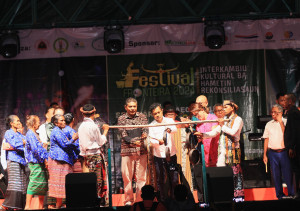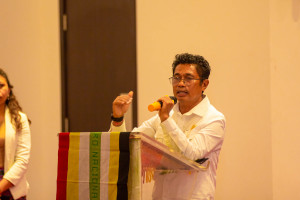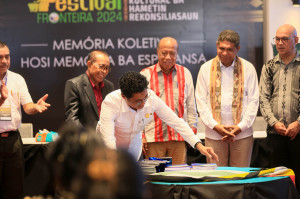The Vice Prime Minister, Coordinating Minister for Social Affairs and Minister for Rural Development and Community Housing, Mariano Assanami Sabino, officially inaugurated the Border Festival 2024 in the village of Oé-bau, Village (Suco) Costa, Administrative Post of Pante Macassar, Oé-Cusse. The event, held under the theme ‘Cultural Exchange to Strengthen Reconciliation’, emphasised the role of cultural heritage in promoting unity and reconciliation between Timor-Leste and the Indonesian province of East Nusa Tenggara (NTT – acronym in Indonesian). 
Members of the Government, the National Parliament and guests from Timor-Leste and Indonesia attended the opening ceremony. In his speech, the Vice Prime Minister emphasised the importance of the festival in promoting reconciliation through traditional cultural practices, such as soru tais (making of traditional clothes), uma lisan (traditional houses), and lia mate and lia moris (traditional ceremonies related to death and everyday life). 
“We aim to pass on the values of fraternity, respect and dignity from generation to generation. This festival is an opportunity to restore human brotherhood’s essence”, said Mariano Assanami Sabino.
In addition to cultural performances, the festival includes seminars and workshops focused on strengthening peace and reconciliation. On October 15th, the Executive Director of the National Centre Chega! I.P., Hugo Maria Fernandes, opened the Art for Friendship and Reconciliation workshop, which brings together artists from Timor-Leste and Indonesia to explore ways of promoting peace through art. 
Mariano Assanami Sabino, Vice Prime Minister; Nelyo Isaac Sarmento, Minister of Youth, Sports, Arts and Culture; Rogério Tiago Lobato, President of the RAEOA Authority; and Abílio Dias Araújo took part in the seminar Reconciliation to Strengthen Peace and Democracy: National and International Perspectives, one of the festival’s main activities.
The Fronteira 2024 Festival will run until October 18th. Its wide-ranging programme includes debates, visits to historic sites, concerts, cultural exhibitions, and the launch of books on strategies for reconciliation and the preservation of shared cultural heritage.